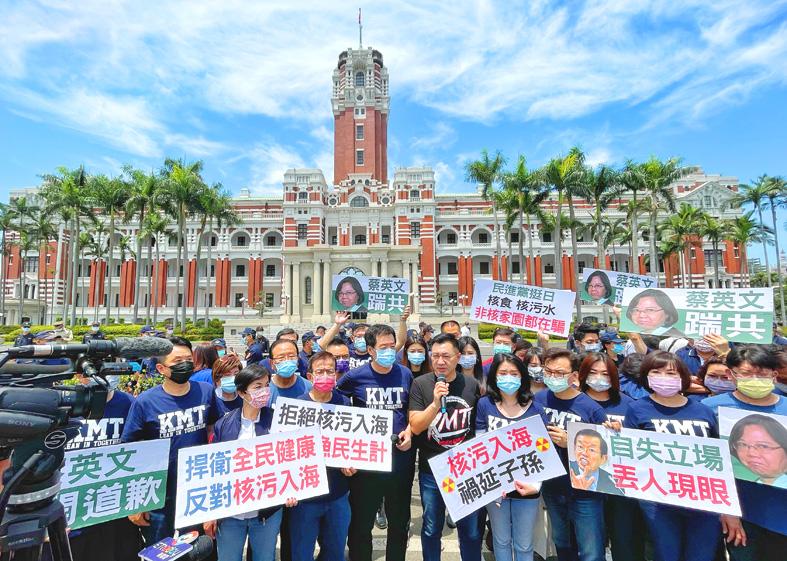The Chinese Nationalist Party (KMT) caucus yesterday demanded that President Tsai Ing-wen (蔡英文) remove Frank Hsieh (謝長廷) as the nation’s representative to Japan and issue a public apology over his statements about wastewater discharge.
Japan on April 13 announced that it plans to release treated wastewater from the disabled Fukushima Dai-ichi nuclear power plant into the ocean, despite protests from neighboring countries.
While he lodged a protest to Tokyo on behalf of the government, Hsieh said in a Facebook post that he could not overlook the fact that Taiwan also discharges water from three nuclear power plants into the ocean.

Photo: Liu Hsin-de, Taipei Times
The KMT on Thursday last week reported to the National Police Agency that it suspected Hsieh of spreading disinformation, and KMT lawmakers have since demanded that Hsieh attend a legislative meeting to report on Taiwan-Japan relations.
KMT Legislator Alex Fai (費鴻泰) yesterday said that South Korea, China, the Philippines and Russia have all voiced their complaints about Japan’s decision, while Taiwan’s representative spoke up for Japan and alleged that Taiwan was doing the same thing.
Fai quoted Atomic Energy Council Minister Hsieh Shou-shing (謝曉星) as saying that the wastewater Taiwan discharges meets normal standards and is different from the situation at the Japanese plant, which was destroyed during the March 11, 2011, earthquake and tsunami.
Fai accused Frank Hsieh of treason, and said his comments and action made him unsuitable to represent Taiwan’s interests abroad.
Fai said he was astonished that Tsai concurred with Hsieh’s comments, adding that such comments and actions were akin to denigrating the Republic of China (ROC) before Japan.
KMT lawmakers yesterday marched to the Presidential Office to voice their complaints.
They also demanded that the Tsai administration lodge formal complaints with the Japanese government on discharging contaminated water into the sea, remove Hsieh from his post and actively participate in international efforts to monitor Japan’s handling of wastewater.
In response, the Presidential Office said that Hsieh has adequately conveyed the Taiwanese government’s concern regarding its plan to pump irradiated water out to sea in two years.
The opposition party’s political machinations are not conducive to furthering and deepening Taiwan-Japan relations, it said, adding that stirring up hatred against Japanese is not helpful to maintaining peace and stability in the region.
Additional reporting by Lee Hsin-fang

Alain Robert, known as the "French Spider-Man," praised Alex Honnold as exceptionally well-prepared after the US climber completed a free solo ascent of Taipei 101 yesterday. Robert said Honnold's ascent of the 508m-tall skyscraper in just more than one-and-a-half hours without using safety ropes or equipment was a remarkable achievement. "This is my life," he said in an interview conducted in French, adding that he liked the feeling of being "on the edge of danger." The 63-year-old Frenchman climbed Taipei 101 using ropes in December 2004, taking about four hours to reach the top. On a one-to-10 scale of difficulty, Robert said Taipei 101

Nipah virus infection is to be officially listed as a category 5 notifiable infectious disease in Taiwan in March, while clinical treatment guidelines are being formulated, the Centers for Disease Control (CDC) said yesterday. With Nipah infections being reported in other countries and considering its relatively high fatality rate, the centers on Jan. 16 announced that it would be listed as a notifiable infectious disease to bolster the nation’s systematic early warning system and increase public awareness, the CDC said. Bangladesh reported four fatal cases last year in separate districts, with three linked to raw date palm sap consumption, CDC Epidemic Intelligence

Two Taiwanese prosecutors were questioned by Chinese security personnel at their hotel during a trip to China’s Henan Province this month, the Mainland Affairs Council (MAC) said yesterday. The officers had personal information on the prosecutors, including “when they were assigned to their posts, their work locations and job titles,” MAC Deputy Minister and spokesman Liang Wen-chieh (梁文傑) said. On top of asking about their agencies and positions, the officers also questioned the prosecutors about the Cross-Strait Joint Crime-Fighting and Judicial Mutual Assistance Agreement, a pact that serves as the framework for Taiwan-China cooperation on combating crime and providing judicial assistance, Liang

US climber Alex Honnold left Taiwan this morning a day after completing a free-solo ascent of Taipei 101, a feat that drew cheers from onlookers and gained widespread international attention. Honnold yesterday scaled the 101-story skyscraper without a rope or safety harness. The climb — the highest urban free-solo ascent ever attempted — took just more than 90 minutes and was streamed live on Netflix. It was covered by major international news outlets including CNN, the New York Times, the Guardian and the Wall Street Journal. As Honnold prepared to leave Taiwan today, he attracted a crowd when he and his wife, Sanni,